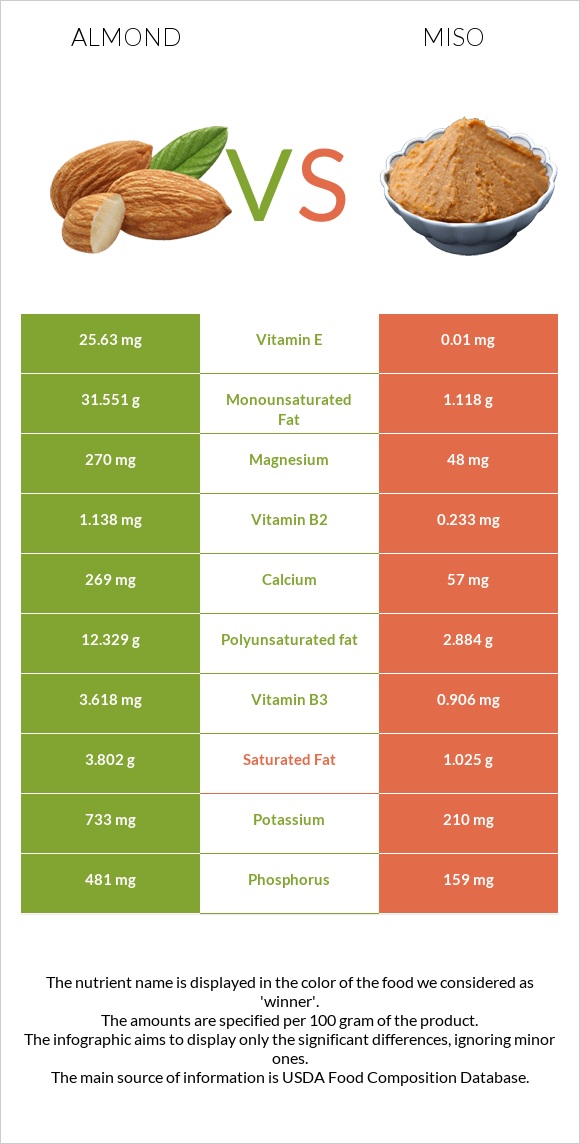Almonds vs. Miso — In-Depth Nutrition Comparison
Compare
Summary of differences between almonds and miso
- Almonds have more vitamin E, vitamin B2, copper, manganese, magnesium, phosphorus, fiber, and calcium, while miso has more vitamin K.
- Almonds cover your daily need for vitamin E, 171% more than miso.
- Almonds contain 6 times more magnesium than miso. While almonds contain 270mg of magnesium, miso contains only 48mg.
- The amount of sodium in almonds is lower.
- Almonds have a lower glycemic index. The glycemic index of almonds is 0, while the glycemic index of miso is 61.
These are the specific foods used in this comparison Nuts, almonds and Miso.
Infographic

Infographic link
Mineral Comparison
Mineral comparison score is based on the number of minerals by which one or the other food is richer. The "coverage" charts below show how much of the daily needs can be covered by 300 grams of the food.
| Contains more MagnesiumMagnesium | +462.5% |
| Contains more CalciumCalcium | +371.9% |
| Contains more PotassiumPotassium | +249% |
| Contains more IronIron | +49% |
| Contains more CopperCopper | +145.5% |
| Contains more ZincZinc | +21.9% |
| Contains more PhosphorusPhosphorus | +202.5% |
| Contains less SodiumSodium | -100% |
| Contains more ManganeseManganese | +153.7% |
| Contains more SeleniumSelenium | +70.7% |
Vitamin Comparison
Vitamin comparison score is based on the number of vitamins by which one or the other food is richer. The "coverage" charts below show how much of the daily needs can be covered by 300 grams of the food.
| Contains more Vitamin EVitamin E | +256200% |
| Contains more Vitamin B1Vitamin B1 | +109.2% |
| Contains more Vitamin B2Vitamin B2 | +388.4% |
| Contains more Vitamin B3Vitamin B3 | +299.3% |
| Contains more Vitamin B5Vitamin B5 | +39.8% |
| Contains more FolateFolate | +131.6% |
| Contains more Vitamin AVitamin A | +∞% |
| Contains more Vitamin B6Vitamin B6 | +45.3% |
| Contains more Vitamin B12Vitamin B12 | +∞% |
| Contains more Vitamin KVitamin K | +∞% |
All nutrients comparison - raw data values
| Nutrient |  |
 |
DV% diff. |
| Vitamin E | 25.63mg | 0.01mg | 171% |
| Sodium | 1mg | 3728mg | 162% |
| Monounsaturated fat | 31.551g | 1.118g | 76% |
| Vitamin B2 | 1.138mg | 0.233mg | 70% |
| Fats | 49.93g | 6.01g | 68% |
| Copper | 1.031mg | 0.42mg | 68% |
| Polyunsaturated fat | 12.329g | 2.884g | 63% |
| Manganese | 2.179mg | 0.859mg | 57% |
| Magnesium | 270mg | 48mg | 53% |
| Phosphorus | 481mg | 159mg | 46% |
| Fiber | 12.5g | 5.4g | 28% |
| Vitamin K | 0µg | 29.3µg | 24% |
| Calcium | 269mg | 57mg | 21% |
| Calories | 579kcal | 198kcal | 19% |
| Protein | 21.15g | 12.79g | 17% |
| Vitamin B3 | 3.618mg | 0.906mg | 17% |
| Potassium | 733mg | 210mg | 15% |
| Iron | 3.71mg | 2.49mg | 15% |
| Saturated fat | 3.802g | 1.025g | 13% |
| Vitamin B1 | 0.205mg | 0.098mg | 9% |
| Fructose | 0.11g | 6g | 7% |
| Folate | 44µg | 19µg | 6% |
| Zinc | 3.12mg | 2.56mg | 5% |
| Selenium | 4.1µg | 7µg | 5% |
| Vitamin B6 | 0.137mg | 0.199mg | 5% |
| Choline | 52.1mg | 72.2mg | 4% |
| Vitamin B5 | 0.471mg | 0.337mg | 3% |
| Vitamin B12 | 0µg | 0.08µg | 3% |
| Carbs | 21.55g | 25.37g | 1% |
| Net carbs | 9.05g | 19.97g | N/A |
| Sugar | 4.35g | 6.2g | N/A |
| Starch | 0.72g | 0% | |
| Vitamin A | 0µg | 4µg | 0% |
| Trans fat | 0.015g | 0g | N/A |
| Tryptophan | 0.211mg | 0.155mg | 0% |
| Threonine | 0.601mg | 0.479mg | 0% |
| Isoleucine | 0.751mg | 0.508mg | 0% |
| Leucine | 1.473mg | 0.82mg | 0% |
| Lysine | 0.568mg | 0.478mg | 0% |
| Methionine | 0.157mg | 0.129mg | 0% |
| Phenylalanine | 1.132mg | 0.486mg | 0% |
| Valine | 0.855mg | 0.547mg | 0% |
| Histidine | 0.539mg | 0.243mg | 0% |
| Omega-3 - ALA | 0.003g | N/A | |
| Omega-6 - Eicosadienoic acid | 0.002g | 0g | N/A |
| Omega-6 - Linoleic acid | 12.32g | N/A |
Macronutrient Comparison
Macronutrient breakdown side-by-side comparison
| Contains more ProteinProtein | +65.4% |
| Contains more FatsFats | +730.8% |
| Contains more CarbsCarbs | +17.7% |
| Contains more WaterWater | +875.5% |
| Contains more OtherOther | +332.8% |
Fat Type Comparison
Fat type breakdown side-by-side comparison
| Contains more Mono. FatMonounsaturated fat | +2722.1% |
| Contains more Poly. FatPolyunsaturated fat | +327.5% |
| Contains less Sat. FatSaturated fat | -73% |
Carbohydrate type comparison
Carbohydrate type breakdown side-by-side comparison
| Contains more StarchStarch | +∞% |
| Contains more SucroseSucrose | +∞% |
| Contains more GlucoseGlucose | +∞% |
| Contains more GalactoseGalactose | +∞% |
| Contains more FructoseFructose | +5354.5% |
| Contains more MaltoseMaltose | +400% |
~equal in
Lactose
~0g





